外研版高中英语Book5 Module1 British and American English Period3 Cultural corner课件(共32张PPT)
文档属性
| 名称 | 外研版高中英语Book5 Module1 British and American English Period3 Cultural corner课件(共32张PPT) | 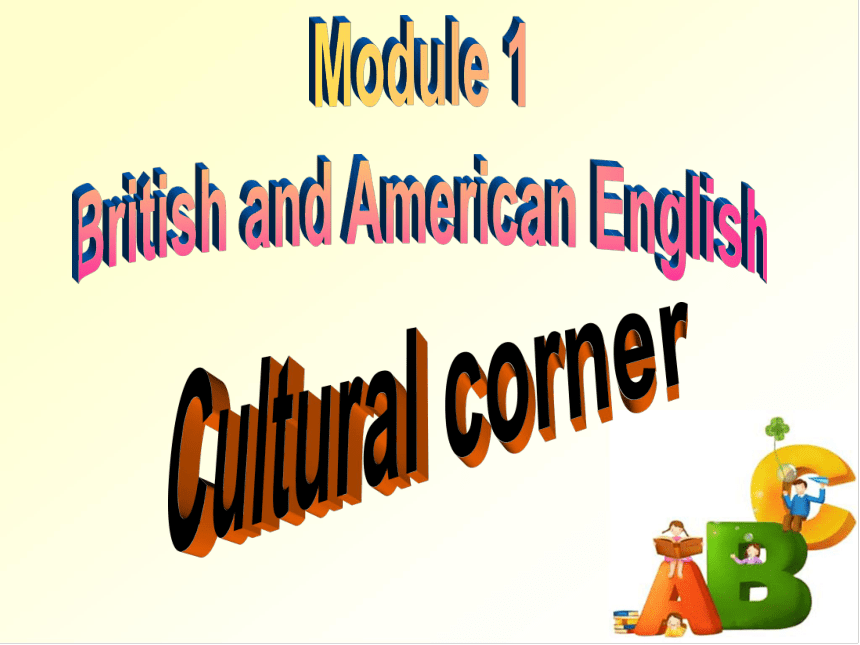 | |
| 格式 | zip | ||
| 文件大小 | 797.1KB | ||
| 资源类型 | 教案 | ||
| 版本资源 | 外研版 | ||
| 科目 | 英语 | ||
| 更新时间 | 2018-12-03 18:52:04 | ||
图片预览

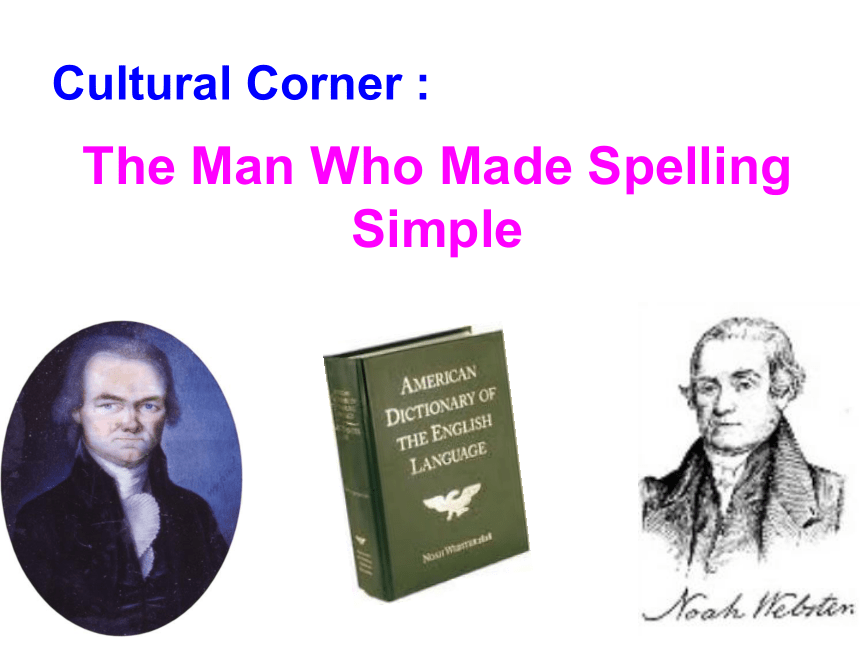
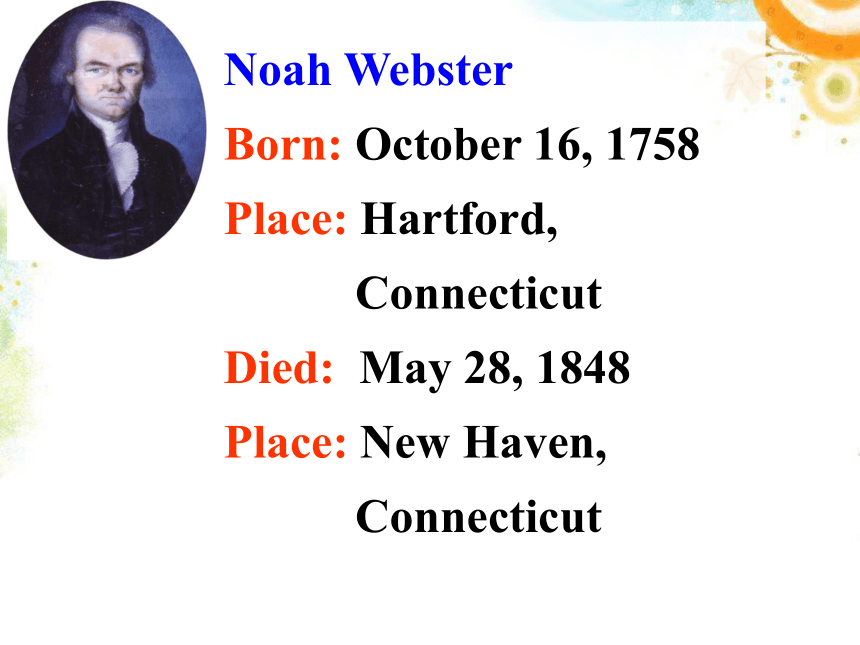
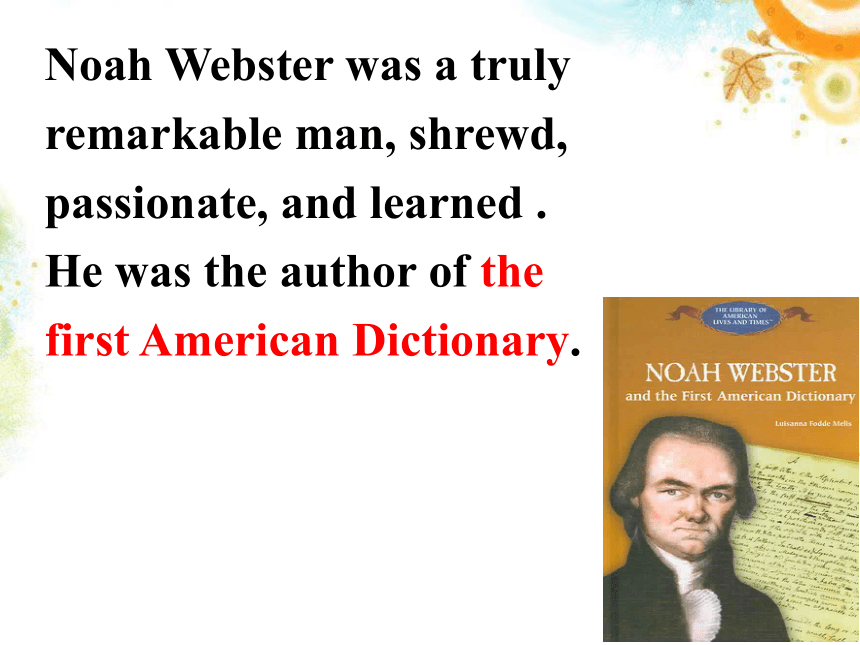
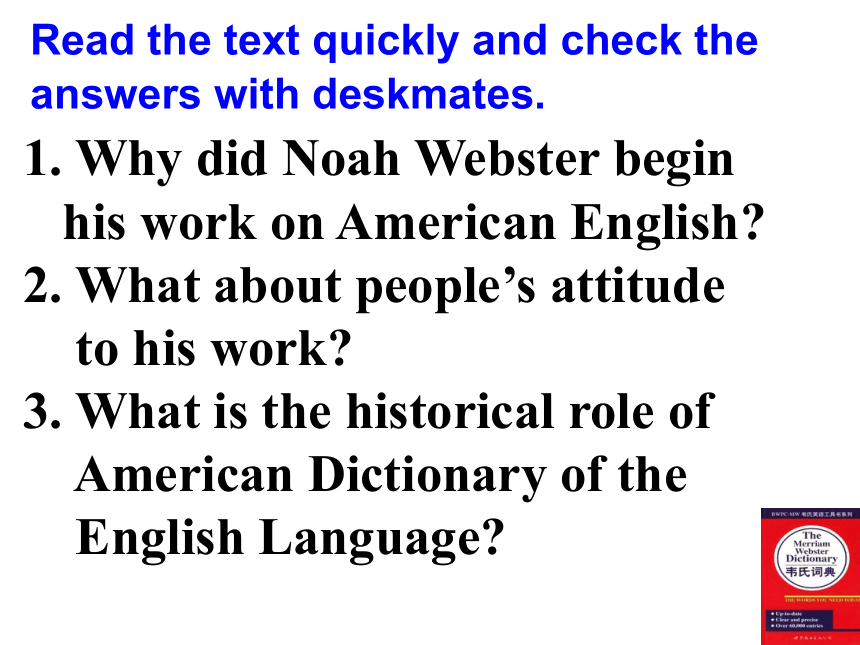
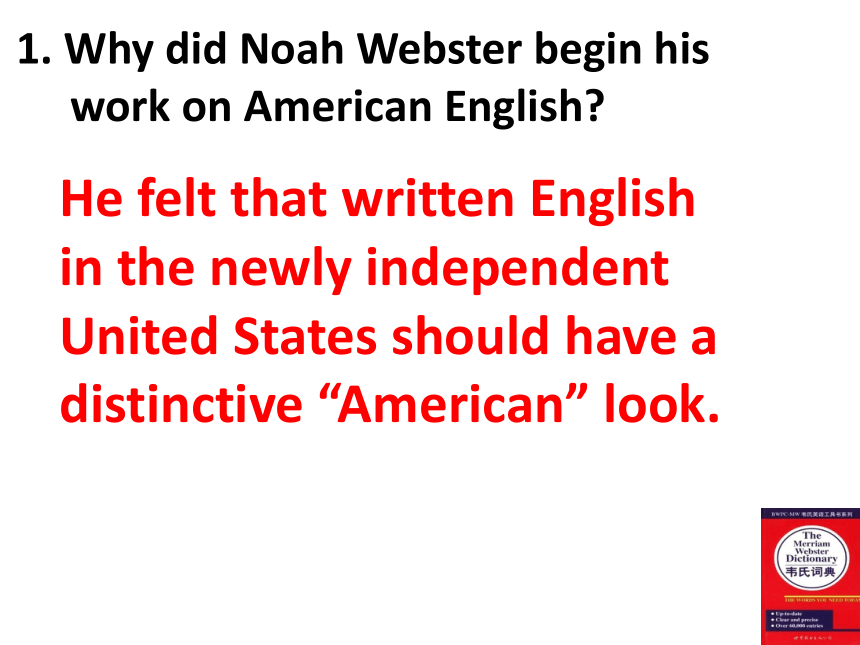
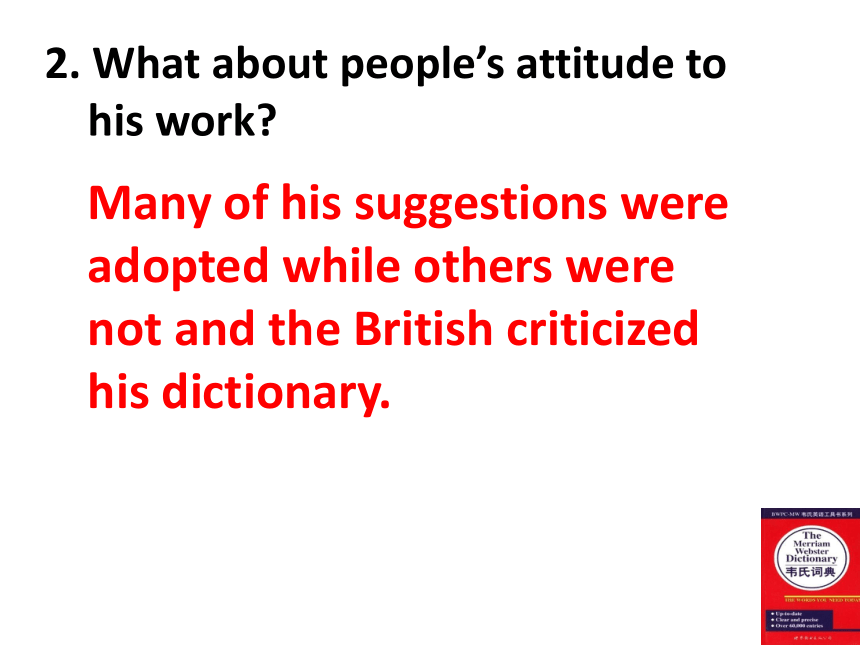
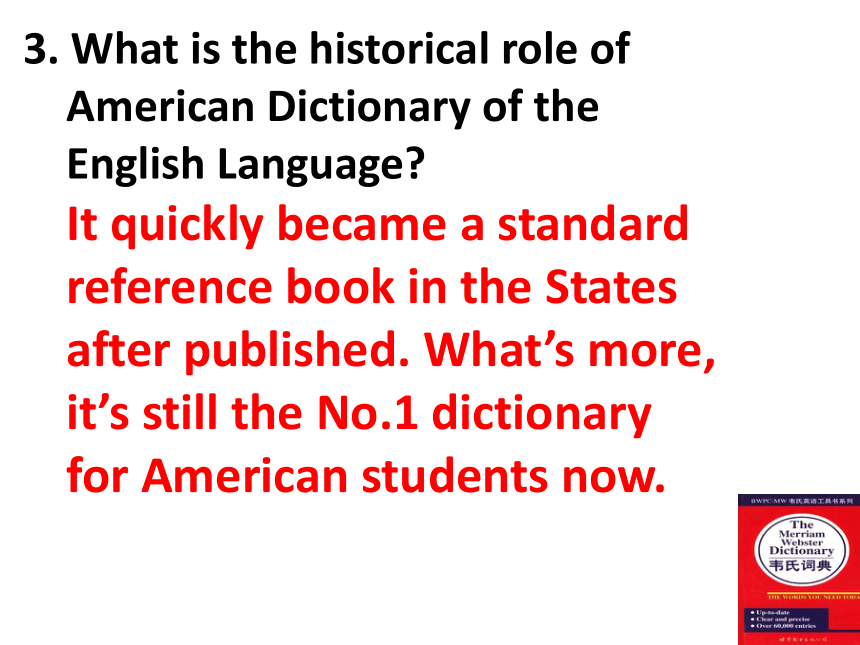
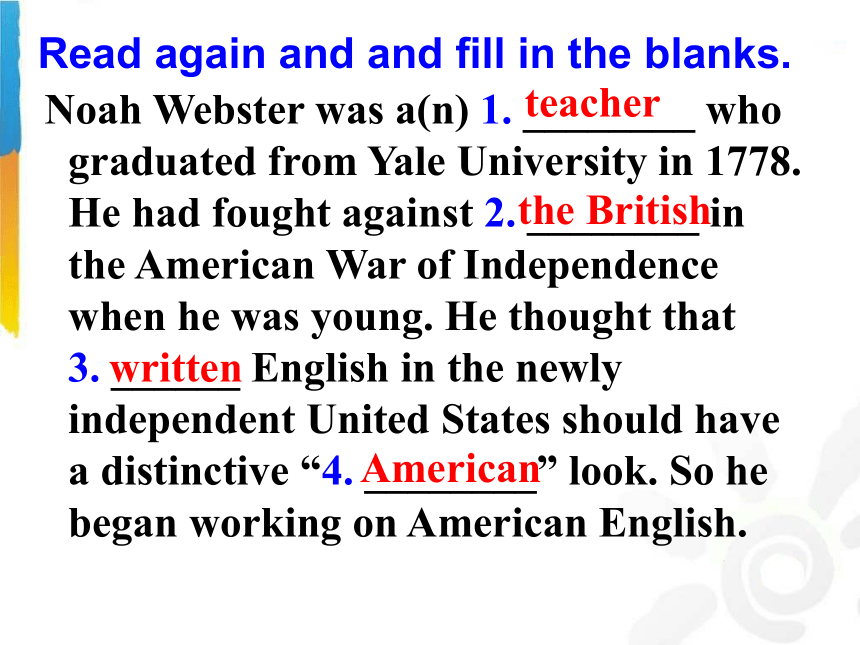
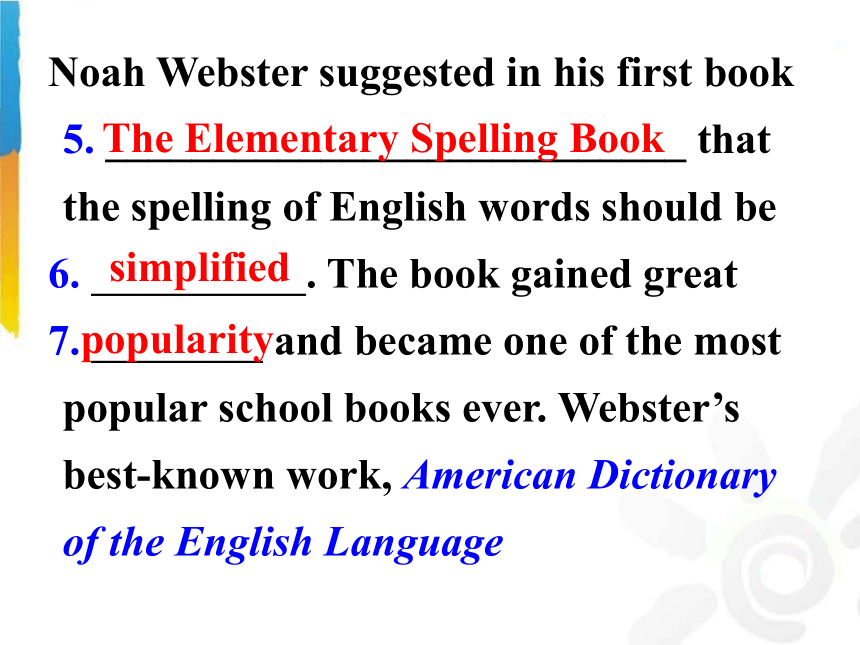
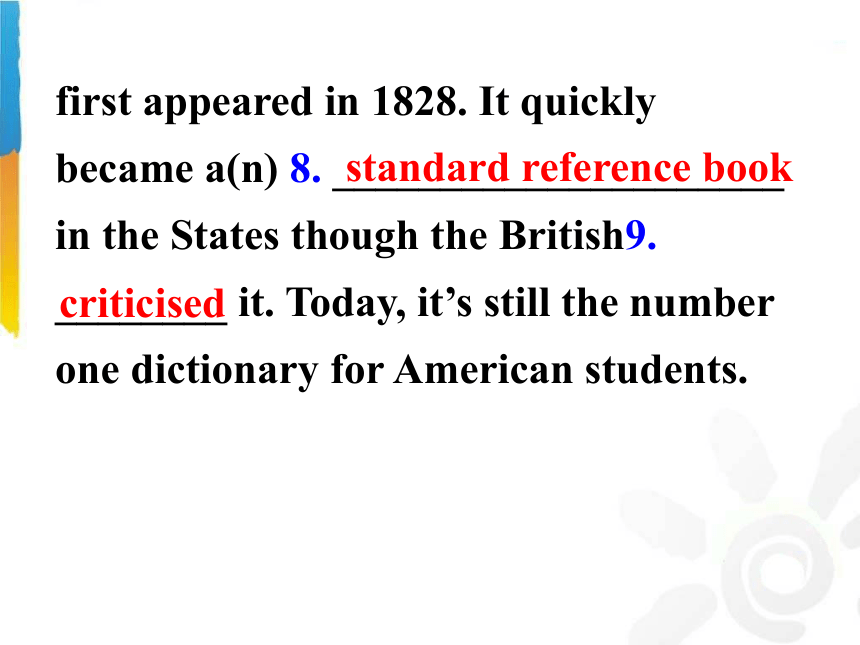
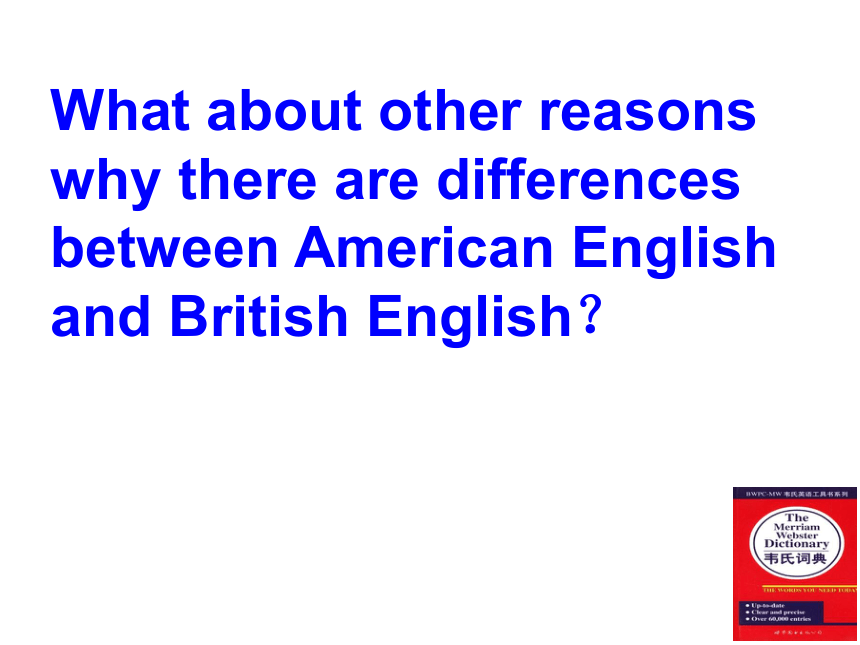
文档简介
课件32张PPT。Module 1
British and American EnglishCultural cornerThe Man Who Made Spelling SimpleCultural Corner :Noah Webster
Born: October 16, 1758
Place: Hartford,
Connecticut
Died: May 28, 1848
Place: New Haven,
ConnecticutNoah Webster was a truly remarkable man, shrewd,
passionate, and learned .
He was the author of the
first American Dictionary.1. Why did Noah Webster begin
his work on American English?
2. What about people’s attitude
to his work?
3. What is the historical role of
American Dictionary of the
English Language?Read the text quickly and check the answers with deskmates.He felt that written English in the newly independent United States should have a distinctive “American” look.1. Why did Noah Webster begin his
work on American English?2. What about people’s attitude to
his work?Many of his suggestions were adopted while others were not and the British criticized his dictionary.3. What is the historical role of
American Dictionary of the
English Language?It quickly became a standard reference book in the States after published. What’s more, it’s still the No.1 dictionary for American students now.Read again and and fill in the blanks. Noah Webster was a(n) 1. ________ who graduated from Yale University in 1778. He had fought against 2. ________ in the American War of Independence when he was young. He thought that 3. ______ English in the newly independent United States should have a distinctive “4. ________” look. So he began working on American English.teacher??????? the British?????? ??????? written ?????? American ??????? Noah Webster suggested in his first book 5. ___________________________ that the spelling of English words should be
6. . The book gained great
7. and became one of the most popular school books ever. Webster’s best-known work, American Dictionary of the English LanguageThe Elementary Spelling Book simplified popularity first appeared in 1828. It quickly became a(n) 8. _____________________ in the States though the British9. ________ it. Today, it’s still the number one dictionary for American students.
standard reference book????? criticised ? ??What about other reasons why there are differences between American English and British English? Many students want to know about the differences between American English and British English. How did these differences come about? There is no quick answer to this question.
At first the language in Britain and America was the same. In 1776 American became an independent country. After that, the language slowly began to change. For a long time the language in America stayed the same, while the language in England changed. For example, 300 years ago the English talked about "fall". Today, most British people talk about "autumn", but Americans still talk abut "fall". In the same way Americans still use the expression "I guess" (meaning "I think"), just as the British did 300 years ago.
At the same time, British English and American English started borrowing words from other languages, ending up with different words. For example, the British took "typhoon" from Chinese, while the Americans took "tornado" from Spanish. In 1828 Noah Webster published the first American dictionary. He wanted to make American English different from British English, so he changed the spelling of many words. That's why the words "colour", "centre" and "traveller" are spelt "color", "center" and "traveler" in American English. Except for these differences in spelling, written English is more or less the same in both British and American English.
The differences are greater in the spoken language. For example, Americans say dance /d?ns/, and in southern England they say /dɑ?ns/. In America they pronounce not /nɑt/ ; in southern England they say /n?t/ . However, most of the time people from the two countries do not have any difficulty in understanding each other. Can you draw the mind map of the passage?Key sentences in this passageFor Americans things are a little bit easier, thanks to a man called Noah Webster, …
thanks to 由于, 因为;幸亏, 多亏常位于句首, 表感谢或讽刺。1.对美国人来说,事情(单词拼
写)稍微好办些,这多亏了一
位叫Noah Webster的人。e.g. Thanks to your help, we finished the work head of time. 多亏你的帮助, 我们提前完成了任务。
Thanks to the bad weather, the match had been put off. 多亏这倒霉的天气, 比赛推迟了。 (be) due to sth./sb. 某人/某物引起的;
由于某人/某物
1.该队的成功在很大程度上是由于
她的努力。
2.他们由于风暴而来迟。 e.g. The team’s success was largely due to
her efforts. ?? They arrived late due to the storm. ? ??单词比较:adopt / adaptadopt
采取; 采纳; 吸收 过继, 收养 (as)
adapt
使适应, 使适合 (to) 改编, 改写 (for)1. After much deliberation, the president decided to ______ her suggestion.
2. The author is going to ______ his play for television.
3. Mr. Kern _____ the orphan as his own son.
4. He tried hard to _____ himself to the new conditions.adoptadaptadoptadapt3. 他的第一本书—《基本拼写课本》,
建议简化英语单词的拼写。 His first book, The Elementary
Spelling Book, suggested simplifying
the spelling of English words3. 它引入了大量新的美式英语
词汇以及它们的读音,使用;
当然,还有新的拼读方式。 It introduced lots of new American
words, with information about their
pronunciation and use, and, of course,
the new spelling.
4. 英国公民抨击这本词典,但它
却在美国迅速成为标准参考书。 The British criticized the dictionary,
but it quickly became a standard
reference book in the States.1. Do exercises 16-18 on page 72.
2. Write a postcard to a friend at home. Tell them about your trip to the UK or the USA. HomeworkThank you!
British and American EnglishCultural cornerThe Man Who Made Spelling SimpleCultural Corner :Noah Webster
Born: October 16, 1758
Place: Hartford,
Connecticut
Died: May 28, 1848
Place: New Haven,
ConnecticutNoah Webster was a truly remarkable man, shrewd,
passionate, and learned .
He was the author of the
first American Dictionary.1. Why did Noah Webster begin
his work on American English?
2. What about people’s attitude
to his work?
3. What is the historical role of
American Dictionary of the
English Language?Read the text quickly and check the answers with deskmates.He felt that written English in the newly independent United States should have a distinctive “American” look.1. Why did Noah Webster begin his
work on American English?2. What about people’s attitude to
his work?Many of his suggestions were adopted while others were not and the British criticized his dictionary.3. What is the historical role of
American Dictionary of the
English Language?It quickly became a standard reference book in the States after published. What’s more, it’s still the No.1 dictionary for American students now.Read again and and fill in the blanks. Noah Webster was a(n) 1. ________ who graduated from Yale University in 1778. He had fought against 2. ________ in the American War of Independence when he was young. He thought that 3. ______ English in the newly independent United States should have a distinctive “4. ________” look. So he began working on American English.teacher??????? the British?????? ??????? written ?????? American ??????? Noah Webster suggested in his first book 5. ___________________________ that the spelling of English words should be
6. . The book gained great
7. and became one of the most popular school books ever. Webster’s best-known work, American Dictionary of the English LanguageThe Elementary Spelling Book simplified popularity first appeared in 1828. It quickly became a(n) 8. _____________________ in the States though the British9. ________ it. Today, it’s still the number one dictionary for American students.
standard reference book????? criticised ? ??What about other reasons why there are differences between American English and British English? Many students want to know about the differences between American English and British English. How did these differences come about? There is no quick answer to this question.
At first the language in Britain and America was the same. In 1776 American became an independent country. After that, the language slowly began to change. For a long time the language in America stayed the same, while the language in England changed. For example, 300 years ago the English talked about "fall". Today, most British people talk about "autumn", but Americans still talk abut "fall". In the same way Americans still use the expression "I guess" (meaning "I think"), just as the British did 300 years ago.
At the same time, British English and American English started borrowing words from other languages, ending up with different words. For example, the British took "typhoon" from Chinese, while the Americans took "tornado" from Spanish. In 1828 Noah Webster published the first American dictionary. He wanted to make American English different from British English, so he changed the spelling of many words. That's why the words "colour", "centre" and "traveller" are spelt "color", "center" and "traveler" in American English. Except for these differences in spelling, written English is more or less the same in both British and American English.
The differences are greater in the spoken language. For example, Americans say dance /d?ns/, and in southern England they say /dɑ?ns/. In America they pronounce not /nɑt/ ; in southern England they say /n?t/ . However, most of the time people from the two countries do not have any difficulty in understanding each other. Can you draw the mind map of the passage?Key sentences in this passageFor Americans things are a little bit easier, thanks to a man called Noah Webster, …
thanks to 由于, 因为;幸亏, 多亏常位于句首, 表感谢或讽刺。1.对美国人来说,事情(单词拼
写)稍微好办些,这多亏了一
位叫Noah Webster的人。e.g. Thanks to your help, we finished the work head of time. 多亏你的帮助, 我们提前完成了任务。
Thanks to the bad weather, the match had been put off. 多亏这倒霉的天气, 比赛推迟了。 (be) due to sth./sb. 某人/某物引起的;
由于某人/某物
1.该队的成功在很大程度上是由于
她的努力。
2.他们由于风暴而来迟。 e.g. The team’s success was largely due to
her efforts. ?? They arrived late due to the storm. ? ??单词比较:adopt / adaptadopt
采取; 采纳; 吸收 过继, 收养 (as)
adapt
使适应, 使适合 (to) 改编, 改写 (for)1. After much deliberation, the president decided to ______ her suggestion.
2. The author is going to ______ his play for television.
3. Mr. Kern _____ the orphan as his own son.
4. He tried hard to _____ himself to the new conditions.adoptadaptadoptadapt3. 他的第一本书—《基本拼写课本》,
建议简化英语单词的拼写。 His first book, The Elementary
Spelling Book, suggested simplifying
the spelling of English words3. 它引入了大量新的美式英语
词汇以及它们的读音,使用;
当然,还有新的拼读方式。 It introduced lots of new American
words, with information about their
pronunciation and use, and, of course,
the new spelling.
4. 英国公民抨击这本词典,但它
却在美国迅速成为标准参考书。 The British criticized the dictionary,
but it quickly became a standard
reference book in the States.1. Do exercises 16-18 on page 72.
2. Write a postcard to a friend at home. Tell them about your trip to the UK or the USA. HomeworkThank you!
